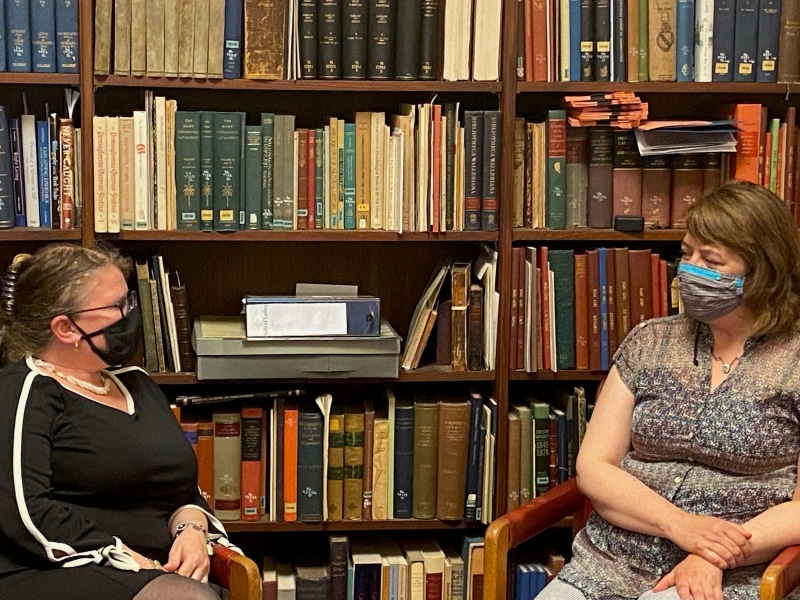Interview with our New Librarian, Emily Guthrie
This past week, our Chief Development Officer Raechel Hammer interviewed our new Librarian Emily Guthrie. Emily started just a short three weeks ago and has been working with Librarian Jim Green as she grasps a deeper understanding of the internal operations of the Library Company. While we will miss Jim, it is heartening to know that as an Emeritus Librarian, we are not bidding him farewell. In fact, Jim will retain a space and place at the Library Company and will be pursuing his own areas of research. Look for an article from Jim in our May Issue of the Enews.
Today, we hope you’ll get to know our new Librarian a little bit better. Below please find a short interview. We hope that you all will meet her in the near future.
What excites you most about working for the Library Company of Philadelphia?
The Library Company is known for many things, foremost among them outstanding collections, a dedicated and deeply knowledgeable staff, and the staff’s generosity in sharing their expertise with the public through reference, teaching, and programming. From inclusive and innovative fellowships and exhibitions to reparative cataloging, the staff’s creative and tireless efforts represent the special collections work that excites me. These sorts of initiatives make an essential difference in making the work of research libraries visible and relevant to successive generations. I am energized by the possibility of contributing to these efforts and being surrounded by the people that are doing such excellent and forward-thinking work.
What are your hopes and ambitions in helping us achieve our mission and sustain historic legacy?
The thorough and thoughtful work that Jim Green and all of the curatorial staff past and present have done to document American society and culture makes it difficult to imagine what collection gaps are left to be filled. That being said, finding those rare missing pieces of the collection puzzle is certainly something that I’m feeling hopeful and ambitious about. I think of collection development policies and institutional mission statements as symbiotic, living documents that uphold the best parts of an organization’s historic legacy while also serving as a contract for a future that celebrates innovation and growth. While I’m certainly not alone these days in seeking out documentation of the back channels and softer, less often heard voices in American history, I hope to identify, acquire, and promote new avenues for collection growth that will allow a broader swath of the public to see themselves and their experiences in the collections.
How have your past experiences shaped your vision for the future of the Library Company’s Reading Rooms?
Throughout my time at Winterthur, I enjoyed daily contact with the research community. My office there was right inside the library’s main entrance, putting me within easy reach of anyone who needed me. I very much enjoyed the surprise element of being able to see everyone who walked through the doors and their questions and comments informed nearly every aspect of my work. Over time, I came to recognize just how many people—from members of the general public to advanced researchers—feel some degree of uncertainty or trepidation when entering a research library for the first time. Many feel as if they should only come in if they have a very specific question or purpose, while others think they should arrive already knowing how the place works. With the increasing availability of digital resources online and attendance numbers slowly dwindling for many libraries, it’s incredibly important for those of us on the inside to lower these barriers of intimidation and be as welcoming and inclusive as possible.
A sense of welcome can be relayed through anything from a friendly face at the entrance and a seamless registration process, to diverse programming that captures the attention of folks who otherwise never would have thought of coming into the library. While these are all things that the staff already does incredibly well, I look forward to building upon their good work, getting to know the research community, and working towards welcoming a more diverse audience.
What notable lessons from your most recent experience at Winterthur Museum, Garden and Library will help you find success here?
Winterthur was an incredible learning experience for me. While it was not my first professional job, it was certainly my longest professional tenure, and so in many ways leaving Winterthur felt like graduating from school. Winterthur taught me how to be an effective teacher, a critical cataloger, a reference librarian, a curator, and ultimately a manager. The staff roles and workflows here at the Library Company are not quite the same as they were at the Winterthur Library, but my broad experience with all aspects of keeping a library running smoothly will do much to allow me to support the work of the Library Company’s talented collections staff.


